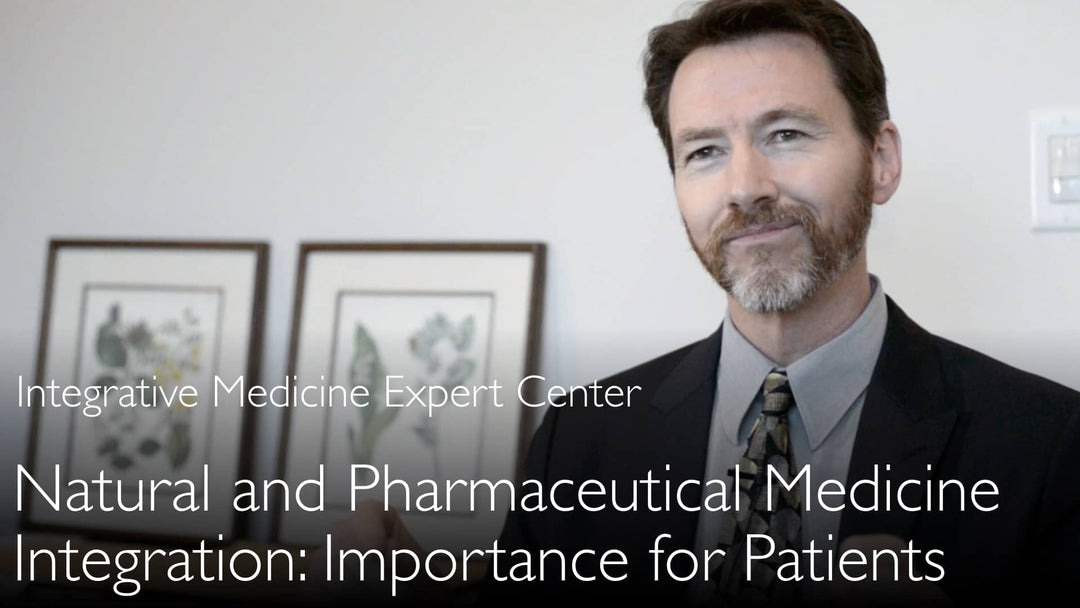Leading expert in integrative oncology, Dr. Kevin Barrows, MD, explains how combining evidence-based complementary therapies with conventional cancer treatments like chemotherapy improves patient tolerance and quality of life while reducing treatment side effects.
Integrative Medicine Strategies to Enhance Chemotherapy Tolerance and Outcomes
Jump To Section
- Integrative Approach to Cancer Care
- Complementary vs Replacement Therapy
- Chemotherapy Side Effect Management
- Chinese Medicine Support During Treatment
- Quality of Life Enhancement
- Patient-Centered Treatment Philosophy
- Integrative Oncology Second Opinion
- Full Transcript
Integrative Approach to Cancer Care
Integrative medicine combines conventional cancer treatments like chemotherapy with complementary therapies to improve patient outcomes. As Dr. Kevin Barrows, MD, emphasizes, this evidence-based approach broadens therapeutic options without philosophical bias toward either pharmaceuticals or natural medicines.
Dr. Anton Titov, MD highlights how integrative oncology provides holistic assessment of cancer treatment situations. The strategic combination addresses both disease control and patient well-being during challenging treatments.
Complementary vs Replacement Therapy
Integrative medicine never replaces conventional cancer treatments that save lives, but enhances their effectiveness and tolerability. Dr. Kevin Barrows, MD, clarifies this critical distinction: "Integrative Medicine integrates complementary and modern methods for the benefit of the patient."
During his discussion with Dr. Anton Titov, MD, Dr. Barrows emphasized that chemotherapy and radiotherapy remain essential for cancer control. Complementary therapies work synergistically with these foundations rather than substituting them.
Chemotherapy Side Effect Management
Reducing chemotherapy side effects represents a primary benefit of integrative oncology approaches. Evidence shows complementary therapies significantly decrease treatment-related nausea, fatigue, and anxiety according to Dr. Kevin Barrows, MD's clinical experience.
Integrative protocols may allow chemotherapy dose optimization by improving tolerance. As Dr. Kevin Barrows, MD, explains, "Sometimes doses of medications can come down when we use Integrative Medicine," potentially reducing medication risks while maintaining efficacy.
Chinese Medicine Support During Treatment
Traditional Chinese medicine modalities offer valuable support during conventional cancer therapies. Dr. Kevin Barrows, MD, specifically cites acupuncture and herbal medicine as effective complementary approaches for chemotherapy patients.
In his conversation with Dr. Anton Titov, MD, Dr. Barrows described this integration as "an exquisite marriage" where Chinese medicine helps patients better tolerate lifesaving treatments. These therapies provide physiological support that complements pharmaceutical interventions.
Quality of Life Enhancement
Improving quality of life during cancer treatment stands as a core benefit of integrative oncology. Dr. Kevin Barrows, MD, observes that patients experience significantly better daily functioning when complementary therapies supplement chemotherapy.
Mind-body practices featured in integrative protocols reduce treatment-related anxiety while enhancing emotional resilience. This holistic approach addresses the multidimensional impact of cancer treatment beyond tumor response metrics.
Patient-Centered Treatment Philosophy
Integrative medicine prioritizes personalized, patient-centered care above therapeutic dogma. Dr. Kevin Barrows, MD, states: "I want to use treatments that do the most good and the least harm" regardless of their origin.
This philosophy empowers clinicians to combine conventional and complementary modalities based on individual patient needs. Dr. Kevin Barrows, MD, emphasizes outcome-focused flexibility over ideological attachment to any single treatment approach.
Integrative Oncology Second Opinion
Seeking specialized second opinions optimizes integrative cancer treatment planning. As Dr. Anton Titov, MD notes, expert consultation helps patients confidently incorporate evidence-based complementary therapies into conventional protocols.
Second opinion consultations evaluate holistic strategies for managing chemotherapy side effects while validating treatment appropriateness. This comprehensive review ensures patients receive optimally integrated care throughout their cancer journey.
Full Transcript
Dr. Anton Titov, MD: - Perhaps it is important to emphasize again that Integrative Medicine is not a replacement for conventional modern medicine. In a serious medical condition - heart disease, hypertension, cancer - Integrative Medicine is not meant to replace modern medical treatment, it integrates complementary and modern methods for the benefit of the patient. Maybe you can emphasize this point from your experience and your wisdom.
Dr. Kevin Barrows, MD: I could not say it better! The goal of Integrative Medicine is not to have any philosophical bias that gets in the way of doing what's best for the patient. I am not especially attached to pharmaceuticals. I am not especially attached to natural medicines. I want to use what is best for you, what's going to do the most good and the least harm. Integrative medicine broadens conventional medicine. Now there are more options - now maybe we don't need such strong medicines, or such risky medicines, or the doses of medications can come down. I will give you a great example of use of Integrative Medicine.
Dr. Kevin Barrows, MD: When patient is going through conventional cancer treatment - like chemotherapy or radiotherapy - Chinese medicine, acupuncture and herbs often, can be so helpful, so supportive. And we are not abandoning the conventional medical care. That's what is probably saving the patient's life. But patients can tolerate cancer treatment much better, they can feel much better, they have a better quality of life if patients are also being supported by Chinese medicine. So to me that is an exquisite marriage of conventional and Integrative Medicine. We are doing the best thing for the patient.




